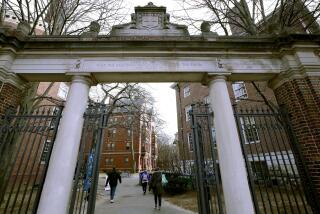Prof. Ellis’ Course Is Yanked Over Lies
- Share via
BOSTON — Two days after Pulitzer Prize-winning historian Joseph J. Ellis admitted lying about his service in Vietnam to decades of Mount Holyoke College students, the small women’s school in Western Massachusetts announced Wednesday that Ellis would no longer teach his signature course on Vietnam and American culture.
With the campus in a state of “total shock,” according to dean of faculty Donal O’Shea, school administrators would not discuss the possibility of disciplinary action. Ellis included descriptions of his duty as an airborne soldier and platoon leader in Vietnam in classes on foreign policy and literature as well as in the culture class.
Ellis’ fabrications were disclosed Monday in a Boston Globe article. The same day, college President Joanne V. Creighton issued a statement praising Ellis’ “reputation for great integrity, honesty and honor.” On Tuesday, Creighton backed off, calling the professor “a beloved teacher and one of the nation’s most prominent historians.”
Creighton, whose initial defense of Ellis drew criticism, added in her Tuesday statement: “I, too, deeply regret the effect of his misrepresentation on students, colleagues and the public.”
In a letter submitted Wednesday to the Boston Globe, Creighton said that, in his 29 years on the Mount Holyoke faculty, no one had questioned his record in Southeast Asia.
“I presumed his innocence when I first heard of this matter,” she wrote. “However, Prof. Ellis has since admitted, both publicly and to me privately, that he did misrepresent his military service.”
Creighton’s letter promised a full investigation of what has emerged as a major academic scandal. Newspaper editorials around the country have focused on the sanctity of truth in the classroom, faulting a famous scholar for lying to his students.
Ellis, 57, is known as one of the country’s leading authorities on 18th century America. He has written prize-winning biographies of Thomas Jefferson and John Adams. In April, his book “Founding Brothers: The Revolutionary Generation” captured the Pulitzer Prize for history.
Beyond a terse statement of regret issued Monday through his attorney, Ellis has had no comment on the controversy.
Although Vietnam revisionism is not uncommon, there is scant precedent for a renowned academic telling students he served there when in fact he did not. In the wake of the revelations about Ellis, the American Historical Assn. said this week that its rules prohibit misrepresenting personal experiences in the classroom.
In a telephone interview from the campus in South Hadley, O’Shea said Wednesday that the school will launch a fact-finding effort among students and faculty to uncover “what went on in Joe’s classes, what Joe told his students. We’re trying to find out what are the facts, what’s true and what’s not true.”
He acknowledged the challenge of this endeavor. “I’m not even quite sure how we do it,” O’Shea said.
O’Shea, a professor of mathematics, said he has not spoken directly to Ellis about the charges and admissions regarding his Vietnam service. In his own interactions with Ellis, “I never heard Joe speak about Vietnam. Never.”
But in a campus with fewer than 2,000 students and a faculty of 200--about half of it hired by Ellis, who once held O’Shea’s job--”there’s just a huge amount of disbelief. There’s disconnect, total shock,” O’Shea said.
Faculty relationships are close in such a small school, he added. Ellis was widely known in the college community “and very much loved. He’s a friend and a colleague and a mentor,” the dean said. The news that this renowned historian embroidered his own history has been met with “sorrow, grief, anguish, anger--the whole gamut of emotions,” he said.
O’Shea said he personally was having trouble processing such a turn of events involving a good friend.
“You sort of think you know somebody, then comes this story like a bolt out of the blue. I think we’re all still trying to come to terms.”
More to Read
Sign up for Essential California
The most important California stories and recommendations in your inbox every morning.
You may occasionally receive promotional content from the Los Angeles Times.












